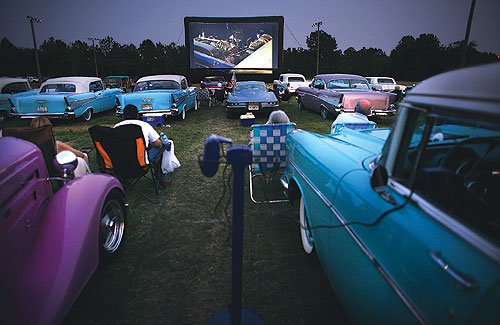Há seis anos, este material foi publicado
It was a Tuesday more than eighty years ago today – June 6, 1933 – that people first drove their cars right up to a screen to watch movies on Crescent Boulevard in Camden, New Jersey. A new form of entertainment was born and Once Upon a Screen remembers once upon a screen in everywhere U.S.A. with a special birthday tribute to the DRIVE-IN theater.

Richard Hollingshead, a movie fan and a sales manager at his father’s company, Whiz Auto Products, in Camden, New Jersey came up with an idea for “Park-In Theaters,” as Drive-Ins were originally called, where patrons could watch movies while sitting in their own cars. He experimented in the driveway of his own house by pinning a screen (white sheet) to some trees, mounting a 1928 Kodak projector to the hood of his car and placing a radio behind the screen for sound. It worked. Hollingshead received a patent for the concept in May of 1933 and opened Park-In Theaters, Inc. less than a month later with a $30,000 investment.
IT’S NEWS!
The first feature film shown to the packed lot in Camden that night, about 400 cars (although some say 600), was Fred Niblo’s, Wives Beware (1932) starring Adolphe Menjou, which was in second-run status at the time. Drive-ins were rarely able to feature first-run movies and usually showed only B-movies – or movies that were not considered Hollywood’s finest fare.
“The whole family is welcome, regardless of how noisy the children are.”
Advertising it as entertainment for the whole family, Hollingshead charged 25 cents per car and 25 cents per person, with no group paying more than one dollar.
The popularity of the drive-in spiked after World War II. The idea caught on and after Hollingshead’s patent was overturned in 1949 drive-in theaters began popping up all over the country, experiencing their hey-day from the late 1950s to mid-1960s, with some 5,000 theaters across the U.S.A. (History.com) And they became a central part of American culture. But they went with the wind due to growing real estate prices initially, growing numbers of walk-in theaters and, of course, the rise of video rentals and other such things. According to History.com, less than 500 drive-in theaters survive today in the United States.
Drive-In Movie Memories:
And now an intermission before we get to the final portion of this tribute:
To end, nostalgic images to celebrate the drive-in and the part it played in so many lives – a movie-going experience that will never be equaled.
Fonte:
https://aurorasginjoint.com




















































Nenhum comentário:
Postar um comentário